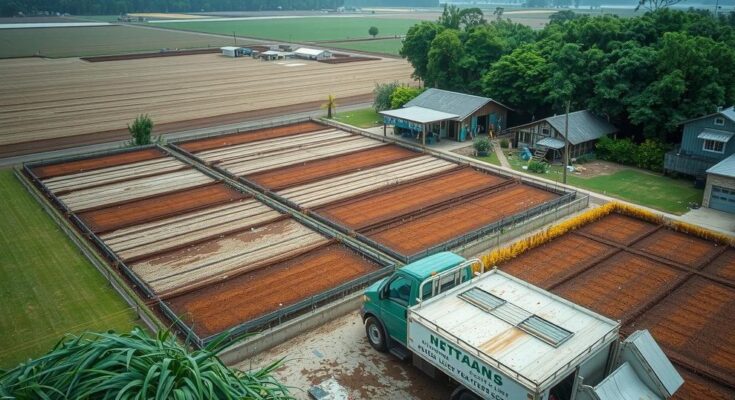Hurricane Helene has left Southern farmers, particularly in Georgia, grappling with extensive crop and infrastructure losses, estimated at over $10 billion across multiple states. Geared toward recovering from substantial financial hits, farmers face emotional exhaustion as they reconsider future operations amid ongoing relief efforts and potential long-term impacts on agricultural markets.
Farmers in Georgia continue to face significant challenges months after Hurricane Helene devastated agricultural lands across the region. The hurricane, which made landfall in late September, caused extensive damage, uprooting crops such as cotton, squash, and cucumbers, and resulted in the destruction of pecan orchards and timber. Chris Hopkins, a farmer in Toombs County, described his emotional struggle post-hurricane, stating that he grappled with the decision to either rebuild or abandon his farming efforts.
According to estimates, the storm inflicted more than $10 billion in damages across several Southern states, notably impacting farmers, timber producers, and agribusinesses from Florida to Virginia. In Georgia alone, losses were calculated at approximately $5.5 billion, while North Carolina faced an estimated $3.1 billion in damages. The economic burden extended beyond crop destruction; it included significant losses in productivity at facilities such as cotton gins and chicken processing plants.
Hopkins reported losing nearly half of his cotton crop, describing it as vulnerable and ready for harvest when the hurricane struck. Despite having insurance, he anticipates a loss of around $430,000, excluding additional costs for equipment repair and debris removal. Timothy Coolong, a professor of horticulture, characterized the losses as staggering and noted that some farmers might not recover from this catastrophe.
Subsequent relief efforts included Georgia’s government reallocating $100 million for emergency loans to farmers affected by Helene, although state law restricts direct disaster aid to individuals. Congressional efforts are underway to provide additional federal disaster aid, although farmers like Jeffrey Pridgen express urgent concern for timely assistance.
Pridgen’s poultry operation faced substantial losses, with hurricane damage destroying several of his chicken houses and thousands of chickens, an incident that has forced him to reconsider his retirement plans. The poultry industry statewide also suffered considerable setbacks, with estimates indicating a loss approaching $683 million due to the need for rebuilding and repairing facilities.
Despite the widespread impact of Hurricane Helene on local agriculture, experts indicate that consumers may not see significant changes in crop prices as other regions can help supply the market. However, the pecan industry could be notably affected, as Georgia contributes about a third of U.S. pecan production. Cotton farmers face further financial challenges this season as prices remain low. In sum, Hurricane Helene’s aftermath continues to burden Southern farmers emotionally and economically, presenting an urgent need for continued support and recovery strategies.
Hurricane Helene, a major Category 4 storm, made landfall in Florida on September 26, 2023, before moving northward and causing extensive destruction to agricultural lands across the Southern United States, particularly impacting farmers in Georgia. The hurricane’s aftermath reveals devastating losses in crops, livestock, and farm infrastructure, with a cumulative damage estimate exceeding $10 billion across affected states. With the fall harvest underway, farmers were particularly vulnerable, facing significant financial and emotional challenges in the recovery process, exacerbated by preexisting economic concerns in the agriculture sector.
The aftermath of Hurricane Helene poses a significant challenge to Southern farmers, particularly in Georgia, where losses are estimated at $5.5 billion. Farmers are left grappling with decisions on whether to rebuild or exit the industry amidst emotional and financial strains. While state and federal relief efforts are in progress, the urgent need for assistance remains evident. Moreover, the broader agricultural landscape is affected, with potential implications for crop prices and local economies.
Original Source: abcnews.go.com




